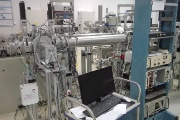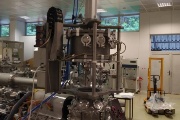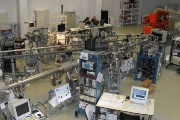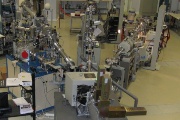
Tandetron 4130 MC
The Tandetron 4130 MC at the Laboratory of Nuclear analytical methods (NAM) is compact, multipurpose linear electrostatic tandem accelerator system produced by High Voltage Engineering Europa (HVEE). It was installed at NAM in the November 2005. The main purpose of the Tandetron is production of ion beams with energies in the range from 400 keV to 24 MeV of almost all elements of the periodic system. In NAM is the medium-current (MC) version Tandetron with a terminal voltage varying from 200 kV to 3 MV. Due to an effective suppression of the X-ray level, the accelerator can be operated in the typical laboratory conditions without a need of extra shielding.
The tandem acceleration is based on a two-stage acceleration process. At the beginning, singly charged negative ions produced by one of two available ion sources enter a low-energy accelerator tube. Their initial kinetic energy at the low-energy tube entrance is adjusted by ion optics elements to be at most 80 keV. The negative ions are accelerated towards the positive high voltage (HV) terminal kept at th
e terminal voltage VT one or two orders of magnitude higher. Inside the HV terminal a gas stripper canal is located where ions lose their electrons due to a charge exchange during collisions with gas molecules, and become n-times positively charged. These positive ions are further accelerated towards the groundedhigh-energy accelerator tube base.
On the low-energy side, the Tandetron is equipped with a dual-source injector system. It comprises two ion sources – a duoplasmatron and a Cs sputter ion source, a Li charge-exchange canal, ion optics elements, a 90° switching/analyzing magnet, and a vacuum system.
Capabilities
- Operating energy range: 200 keV – 10 MeV
- Terminal voltage: 200 kV – 3 MV
- Produced accelerated ions: H – Au
- Ion beam currents: nA – µA









